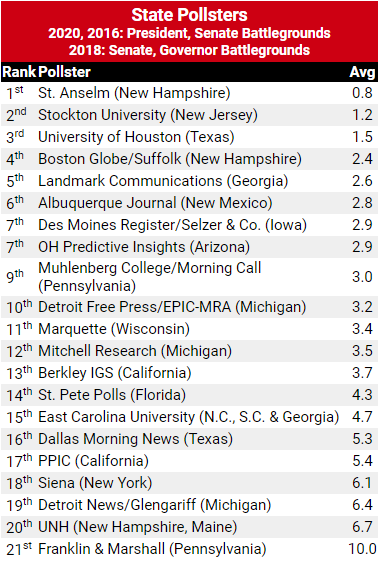
HOUSTON – The Hobby School of Public Affairs at the University of Houston has been named one of the nation’s top election polling organizations for the accuracy of its findings.
It ranked third among pollsters working within a single state, the only Texas operation among the top 15 in the RealClearPolitics Polling Accountability Initiative. RealClearPolitics is a nonpartisan political news website known for its aggregation of polling data.
Hobby School Dean Jim Granato said the ranking is a recognition of the expertise required to ensure the school’s polling captures the attitudes of state residents, even as the population – and the ways in which people communicate – have changed.
“Political polls are valuable for the insight they can provide into what people are thinking, and the Hobby polls have a long history of accurately capturing the zeitgeist of Texans,” Granato said. “That information is helpful to anyone seeking to better understand the state’s growing population, whether they are running a political campaign or seeking solutions to the critical issues of the day.”
Renée Cross, senior executive director and researcher at the Hobby School, and Mark P. Jones, senior research associate at the Hobby School and political science fellow at Rice University’s Baker Institute for Public Policy, lead the school’s election survey team.
The rankings separate polling operations into two categories – those working within a single state, such as the Hobby School, and multistate operations – and are designed to encourage accountability among pollsters and restore public trust in political and election polling. The latest rankings were based on how accurately pollsters matched the final electoral results in the 2020 U.S. presidential and Senate races. In 2020 election polling, the Hobby School projected that Donald Trump would defeat Joe Biden by 5.3% in the Lone Star State. Trump ultimately carried Texas by 5.6%.
The Hobby School’s November 2022 midterm election polling was also highly accurate, finding that the Harris County judge’s race was too close to call, mirroring the final result in which incumbent Lina Hidalgo beat challenger Alexandra Del Moral Mealer by less than 16,000 votes. It found incumbent Gov. Greg Abbott held a 13-point edge over Beto O’Rourke. Abbott ultimately beat O’Rourke by 11 points, well within the poll’s margin of error.
Cross acknowledged that the buzziest electoral matchups draw the most attention, but she said the political polls also address the school’s focus on civic participation by measuring public attitudes about key issues. This year’s polling asked voters about issues ranging from crime, immigration and the border to voting rights and abortion rights.
“These election surveys can be about more than the horserace,” Cross said. “Surveys can allow discussion of the policy issues that people are most concerned about, including what they think about potential legislative solutions. If public involvement is a vital component of democracy, then public opinion certainly plays a key role.”
Collecting that public opinion has become considerably more complicated in the more than 40 years since the Hobby School, then known as the Center for Public Policy, began conducting electoral surveys under the leadership of political scientist Richard Murray.
For one thing, fewer than one-third of U.S. households still have a landline, according to the Pew Research Center. And changing habits mean many people won’t answer a call unless they know who is calling. Pollsters have addressed that through text messaging, online surveys and other efforts to reach a broad spectrum of respondents.
Simply getting a response from a large number of people isn’t enough, however. Jones said it is crucial to ensure the sample surveyed closely matches the traits of those whose attitudes you are trying to capture, including age, gender, race, ethnicity and partisan affiliation. For electoral polls, that requires a deep understanding of who is likely to vote to ensure no one group is over- or underrepresented. But knowing who is likely to vote can be a moving target – pollsters and political scientists are still learning about the behavior of younger voters, for example.
Once the survey sample is as closely matched as possible, statistical analysis is employed to weight the sample to improve accuracy.
“Methods that worked years ago are no longer enough to ensure we are accurately measuring voter attitudes,” Jones said. “We are constantly refining our methods to hone our findings.”
In addition to its electoral polling, Hobby School researchers produces surveys exploring a number of other issues affecting Texans, most recently including COVID-19 vaccine hesitancy, the economic impact of the pandemic and the lasting impact of Hurricane Harvey.
- By Jeannie Kever